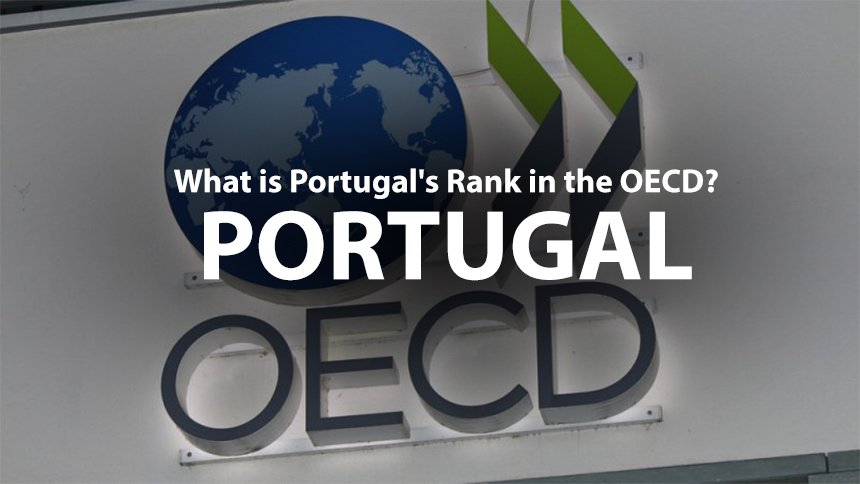Welcome to another interesting journey to Portugal with a new question: what is Portugal’s Rank in the OECD?
Portugal is emerging as a popular destination for immigrants all over the world. A lot of people are interested in learning about the visa programs in Portugal, the vibrant cities of Lisbon, Porto, Sintra, and Algarve, and many other things. At the same time, it is obvious to ask: what is Portugal’s rank in the OECD?
So, let’s find out the answer to this question. This article reveals what is Portugal’s rank in the OECD.
What is Portugal’s Rank in the OECD in 2011?
Eurostat in 2011 explained that the expenditure of General Government by main function, as a percentage of Total Expenditure, was as follows (compared to the Eurozone and EU averages):
| Function | Portugal | Eurozone | EU | Country with the highest % | Country with the lowest % |
| Social Protection | 36.7% | 40.7% | 39.9% | 43.8% (Denmark) | 26.1% (Cyprus) |
| General Public Services | 17.1% | 13.8% | 13.5% | 24.6% (Greece) | 8.3% (Estonia) |
| Health | 13.8% | 14.9% | 14.8% | 18.1% (Czech Republic) | 7.3% (Cyprus) |
| Education | 12.9% | 10.1% | 10.9% | 16.9% (Estonia) | 7.9% (Greece) |
| Economic affairs | 8.2% | 8.4% | 8.2% | 16.9% (Romania) | 6.1% (Denmark) |
| Public order and safety | 4.0% | 3.7% | 3.9% | 7.1% (Bulgaria) | 2.5% (Luxembourg) |
| Defence | 2.7% | 2.7% | 3.0% | 4.6% (Greece) | 0.9% (Ireland) |
| Recreation, culture, and religion | 2.2% | 2.2% | 2.2% | 5.0% (Estonia) | 1.1% (Italy) |
| Housing and community amenities | 1.3% | 1.8% | 1.7% | 5.8% (Cyprus) | 0.6% (Denmark) |
| Environmental protection | 1.1% | 1.8% | 1.7% | 3.3% (Netherlands) | -0.9% (Estonia) |
Also according to Eurostat in 2011, the expenditure of the General Government by three of the main functions, as a percentage of GDP, was as follows (compared to the Eurozone and EU averages):
| Function | Portugal | Eurozone | EU | Country with the highest % | Country with the lowest % |
| Social Protection | 18.1% | 20.2% | 19.6% | 25.2% (Denmark) | 11.9% (Slovakia) |
| Health | 6.8% | 7.4% | 7.3% | 8.5% (Netherlands) | 3.4% (Romania) |
| Education | 6.35% | 5.02% | 5.34% | 7.79% (Denmark) | 3.63% (Bulgaria) |
What is Portugal’s Rank in the OECD in 2023?
Apart from past years, it is necessary for you to stay updated with the latest information about the ranking of Portugal. So, we should focus on what is Portugal’s rank in the OECD in 2023.
Portugal has been ranked as one in the list of the economies that have expanded the most in 2023. This ranking took place among 27 countries in the Organization for Economic Cooperation and Development (OECD), and Portugal ranked fifth with a GDP variation of 2.3%.
According to data from INE and reported by ECO, the economy of Portugal even outperformed the average of the European Union and the Euro Zone. Both countries, EU and EZ, have a GDP variation of 0.5%, and the OECD (1.6%). These are the only countries that have been surpassed by Costa Rica (5.1%), Mexico (3.1%), the United States (2.5%), and Spain (2.5%).
Portugal is one of the five countries that have showed the highest GDP growth. However, you should not overlook the fact that from 6.8% in 2022 to 2.3% in 2023, the economic growth of the country dramatically slowed down.
Within the setting of greater underlying inflation in the OECD region, initial annual estimates suggest that OECD GDP growth slowed to 1.6% in 2023, compared to 2.9% in 2022, as stated in the same report.
Data is available for 27 countries of the OECD, and among them, 10 have documented a GDP contraction in 2023. Out of those countries, 11 member countries have no information yet. Estonia has seen the worst contraction, at -3.0%. Growth was positive but slowed in 14 countries.
There are just three economies that have recorded higher rate of growth in 2023 as compared to that in the previous year of 2022: Japan (1.9% compared to 1%), the United States (2.5% compared to 1.9%), and Costa Rica (5.1% in 2023 compared to 4.6% in 2022).
Evolution of the Number of Public Employees in Portugal (1968–2023)
|
|
What is Portugal’s Rank in the OECD in term of Economy?
Here is the state of the regional economy of Portugal at the level of its local areas.
| Rank | Region | GDP in euros € | % of GDP | GDP per capita | |
| In euros € | As % of
Portugal average |
||||
| 1 | Lisbon Metropolitan Area | 87,368,251,000 | 36.1% | 30,462 | 129.5% |
| 2 | North Region | 71,872,968,000 | 29.7% | 20,137 | 85.6% |
| 3 | Centro Region | 45,028,735,000 | 18.6% | 20,161 | 85.7% |
| 4 | Alentejo Region | 15,157,115,000 | 6.3% | 21,741 | 92.4% |
| 5 | Algarve Region | 11,624,407,000 | 4.8% | 26,754 | 113.7% |
| 6 | Autonomous Region of Madeira | 6,020,507,000 | 2.5% | 23,675 | 100.6% |
| 7 | Autonomous Region of the Azores | 5,109,502,000 | 2.1% | 21,096 | 89.7% |
| Portugal | 242,340,811,000 | 100.0% | 23,531 | 100.0% | |
The economy of Portugal is ranked 34th in the Global Competitiveness Report published in the World Economic Forum in 2019. The European Union (EU), whose nations accounted for 74.6% of the imports of Portugal and 71.4% of its exports in 2020, is the hub for the vast majority of the trade of the whole world.
Portugal has been a member of the Eurozone since its founding, and its currency is the euro (€). The main stock exchange in Portugal is Euronext Lisbon, while the central bank of the country is the Banco de Portugal, which is a member of the European System of Central Banks.
Employment and Wages
Now, it is a time to find out what is Portugal’s rank in the OECD when it comes to employment and wages. First of all, let’s see how many people are unemployed in this country which has ranked fifth in OECD overall.
The rate of joblessness was 5.9% in the first quarter of 2022.
Since the end of 2013, there has been a consistent decline in the rate of unemployment, which represents a reversal of the trend of increasing unemployment that had been observed since the 2000s. With the effects of the financial crisis of 2007–2008, this negative tendency became more evident, and the rate of unemployment rose. It sets a record in early 2013 at 17.7%.
The decline in unemployment is linked to the expansion of the economy of Portugal, which began in the third quarter of 2014 (after decreasing in 2011, 2012 and 2013). It continued in the second quarter of 2015 with a 1.5% annual GDP growth. The amount of persons who left the country to find job in other countries has also positively impacted the decline in unemployment.
This was particularly true in 2013 when the labor force fell by 1.6% during the first nine months of the year. The methodology employed by Statistics Portugal (for example, individuals pursuing internships or professional training do not count as unemployed), the prior significant job loss, the rise in tourism, and the resurgence of the agricultural sector, where many jobs were created, have all had an impact on the decline.
Although Portugal is both a developed country and a high income country, it has the lowest GDP per capita in Western Europe. In 2018, it ranked ninth among the 27 member countries of Europe with the lowest purchasing power. All these figures have originated from Eurostat.
Wages
The minimum amount of monthly wage in Portugal is 820 euros from 1st January, 2024). Before, that time it had been set at 760 euros. This minimum wage was established in January 2021, having previously been raised from 580 euros in 2018. The least amount of wage in Portugal has been increasing since 2015, where it stood at 505 euros.
After reaching 505 euros as the minimum wage in 2015, it has been rising ever since. The average net wage is 1148 euros (US$1269), and the average gross wage is 1670 euros (US$1846), almost equal to that of Poland and Estonia. Twelve monthly salary payments plus the compensation of one month in the form of a Christmas bonus and one month for bonus of a holiday total fourteen times the wages of an employee.
Article 273 of the Labor Code states that the government, confederations of the employers, and trade union confederations consult and negotiate in the Permanent Social Conciliation Commission to determine the minimum wage in Portugal.
| Year | Minimum Wage | Average Wage |
| 2015 | 505 € | 834 € |
| 2016 | 530 € | 846 € |
| 2017 | 557 € | 865 € |
| 2018 | 580 € | 896 € |
| 2019 | 600 € | 912 € |
| 2020 | 635 € | 968 € |
| 2021 | 665 € | 1,011 € |
| 2022 | 705 € | 1,019 € |
| 2023 | 760 € | 1,049 € |
| 2024 | 820 € | 1,090 € (Q1 2024) |
Graduate Unemployment
Approximately 8% of the persons holding a degree did not have a job in 2008, and a far higher percentage were underemployed. This was closely linked to a general lack of employability and inadequate preparation of the students for the workforce. These facts were observed in many of the courses in various sectors that specific departments or higher education institutions offered.
An entirely new strategy to address the issue was the adoption of the Bologna process and other educational changes, including as the mandatory closure of several departments, courses, colleges, and private universities after 2005 owing to a lack of academic rigor and low teaching standards.
In 2007, state officials looked into some major private universities and after a critical investigation, they immediately shut down the two universities of them. Furthermore, because to their poor quality, low demand from prospective students, or low interest from businesses, several degrees offered by the public system were discontinued.
Under the governmental programs of XVII Governo Constitucional , secondary and post-secondary non-higher education, which consists of technical and vocational education, has been redeveloped since 2007. All this process was done under the leadership of Prime Minister José Sócrates.
As of March 2014, the rate of unemployment for graduates between those of age 15 and 24 was above 35.4%, which indicates a rise when we do a comparison with January and February 2014.
Due to the current unstable situation of the economy, 57% of young Portuguese people intend to emigrate.
FAQs
Q1. Is Portugal an OECD country?
Portugal committed itself to fulfilling the core objectives of the Organization when it signed the Convention establishing the Organization for Economic Co-Operation and Development on December 14, 1960, along with nineteen other countries.
Q2. Where does Portugal rank in the world economy?
Portugal is currently ranked 50 of the major economies. However, according to the evaluation of OECD in 2023, Portugal has ranked fifth in number.
Q3. How does Portugal compare to other countries?
Portugal outperforms other countries in the Better Life Index in a number of well-being-related categories. Portugal scores better than average in terms of environmental quality and home safety. In terms of income, social ties, civic involvement, and life happiness, it performs worse than average.






